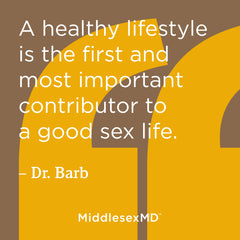I love options. Moose Tracks or Mackinaw Island Fudge? Mocha or machiatto? Phillips screwdriver or allen wrench?
Mostly, I like having options for my patients. At this awkward middle-age time of life, issues are complex and solutions are rarely straightforward. So I like to have a toolbox of treatment options to choose from. If one method doesn’t work, maybe another will.
To be clear, I always start with the most natural, straightforward treatment possible, postponing pills, prescriptions, and hormones. To this end, a healthy lifestyle is the first and most important contributor to a good sex life. Along with lavish use of moisturizers, lubricants, toys, and imagination.
But when these things fall short, it’s nice to have options.
 That’s what testosterone therapy offers—another tool. Another treatment regimen that might fan a faltering libido and fading intimacy in an otherwise healthy relationship. Like any treatment, this isn’t a silver bullet or a magic pill. In fact, it’s controversial. There just isn’t a lot of research on long-term use or even on how testosterone functions in women. (Spoiler alert: a lot different than in men.) It isn’t FDA-approved, although it’s been prescribed “off-label” for decades in the US and is prescribed legally in Europe and elsewhere.
That’s what testosterone therapy offers—another tool. Another treatment regimen that might fan a faltering libido and fading intimacy in an otherwise healthy relationship. Like any treatment, this isn’t a silver bullet or a magic pill. In fact, it’s controversial. There just isn’t a lot of research on long-term use or even on how testosterone functions in women. (Spoiler alert: a lot different than in men.) It isn’t FDA-approved, although it’s been prescribed “off-label” for decades in the US and is prescribed legally in Europe and elsewhere.
In women, testosterone is produced at much lower levels than in men, mostly in the ovaries and adrenal glands. As we age, and especially if our ovaries have been removed, testosterone levels drop sharply. This isn’t the only reason for diminishing sexual desire but it may be part of the picture. (In medicalese, a distressing loss of libido is called hyposexual desire disorder—HSDD.)
Since declining testosterone levels, menopause, and HSDD tend to happen in tandem, maybe a causal link exists among them, so the thinking goes. Obviously, it’s more complicated than that, but for some women, a little testosterone boost just seems to work. As a recent bulletin from Harvard Medical School states: “…in some but not all studies, testosterone therapy has been shown to be an effective treatment for HSDD in carefully selected postmenopausal women.” In my clinical experience, testosterone therapy improves libido, desire, and/or the ability to orgasm in about 60 percent of the women who take it.
So, what are those “carefully selected” qualities that make a patient a good candidate for testosterone therapy?
First, testosterone won’t cure difficulties in a relationship that may be contributing to intimacy problems. Other libido-killers include depression, fatigue, anxiety, certain medications, and the usual menopausal suspects: loss of estrogen, night sweats.
In the absence of physical or psychological factors, women who are distressed by their lack of libido (the classic definition of HSDD) might find relief with a little extra testosterone in their system. I monitor blood levels during treatment with the goal of restoring testosterone to the level you probably had when you were 25 years old.
Some women (about 20-30 percent of my patients) experience some added benefits, such as improved mood and more energy, while another 10 to 15 percent have less positive side effects, like unwanted hair growth or acne. And for about 40 percent of my patients, testosterone therapy isn’t helpful at all.
Testosterone can be safely applied topically; I usually prescribe a gel, the same FDA-approved topical gel that is used by men, but at one-tenth the dose, which I find offers a safe and consistent delivery of the medication.
For some women, testosterone is a game-changer and for others, not so much. Since the potential benefit is so positive and the detriment is minimal, in my opinion, testosterone therapy is a solid treatment option. A woman who’s tried it will tell her story in our next blog post.
 Dr. Barb DePree, M.D., has been a gynecologist and women’s health provider for almost 30 years and a menopause care specialist for the past ten.
Dr. Barb DePree, M.D., has been a gynecologist and women’s health provider for almost 30 years and a menopause care specialist for the past ten.


3 comments
What a great website, I am currently on TRT therapy and it’s great to see that there are physicians that will stand up and do what’s best for the patient not just what is FDA approved, it’s amazing how much my life has changed since starting on Testosterone, it’s not for everyone, however I suffered for more than 25 years after a hysterectomy at the age of 25, it’s sad that it took that long for someone to finally take me and my symptoms seriously!
I recommend that women use the physician finder on Menopause.org, the website of the North American Menopause Society. Here’s a direct link to that service: www.menopause.org/for-women/find-a-menopause-practitioner
Thank you for creating this website! I just found it tonight.
How do I find a physician in my area that will prescribe Testosterone? My Gynecologist is very conservative and will not venture in that direction.